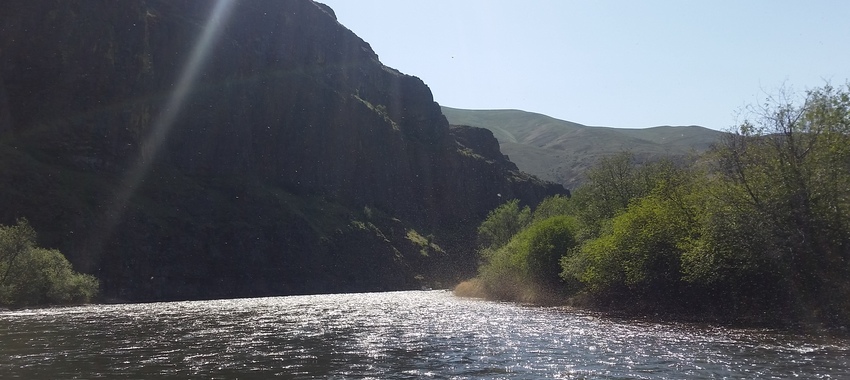Important Dry Fly Fishing Tip
May 5, 2015
The fishing has been good this past week on the Yakima River. At times it has been extremely technical (which is a trade term meaning damn tough). There has been no shortage of feeding fish though. A few of these days have been the type that long time anglers dream about. Fish feeding tight to the brush lines, selecting only the most vulnerable bugs, and the only cast that catches fish are perfect casts. But only if you drift it perfect again, and again, and again until your bug happens to coincide with their feeding rhythm. Here is a good video with some tips.
Personally I love the technical aspects of small dry fly fishing. I have been guiding for 15 years and over that time I have seen the overall skill set of the average guided angler change. Not in a bad way, its just different. When I first started guiding there were lots of guests capable of accurately placing and drifting #18 Caddis flies. They were willing to take less fish and work very hard for a few as long as it was on small dry flies. Fishing a small dry fly was the norm, and the guests were usually very good at it (overall average).
Over the last decade, marvelous inventions like the Thingamabobber and Chubby Chernobyl have allowed the angler to be successful with a little less grace. The drop 'n plop routine works when fishing big dry flies, bobbers, and dry droppers. Not to say these things are bad, and I hope I don't sound like a jerk but accurately placing and drifting a small dry fly is the zenith of stream fishing with a fly. If you love fly fishing, and want to either get better or test your skill then focus your next outing on fishing small dry flies. It requires touch, finesse, and allows a fine fly rod to do what it was made to do. These rods were meant to place flies delicately within inches of the prospective target. Often a trout living next to some bushes in fast currents. Often these casts also require the angler to put a little hook or reach into it as well. These situations are why we practice casting, buy fine rods, good lines, and study hatches. It is rewarding and something that not everyone is good at. It takes some practice. WATCH THIS VIDEO.
"Sipping Dry" trailer - by Sharptail Media | Fly Fishing Movie from The Fly Fishing Film Tour on Vimeo.
I won't rant too long, but I encourage you to struggle, struggle, struggle, and struggle... at that point you will begin to succeed. As you gain skill in the small dry fly arena all the issues like your fly not floating well and not being able to see your very well will go away. If the fly hits exactly where you are looking... it is easy to see. If it hits 4' to the right.... you'll say "I can't see my fly" and it will be true! Because little flies can be tougher to see. But not if they hit the spot you are aiming. Some folks have legitimate vision issues but my experience has been that it is usually a fishing issue. I also hear things like "my fly isn't floating".... well. That is because you are either slapping the water with it or your cast doesn't have any true line speed. A fly that is cast well gets up to nearly 200 mph during the cast. Shouldn't that be enough to dry it off with one false cast?!!! It is, but a lot of folks don't get good line speed and their flies get soggy, stay soggy, and guess what. They sink. Practice getting some decent line speed, set the fly down soft, and your fly will float fine. Hit where you are aiming and between these two things you will be in the game. Small dry fly fishing will become much easier, more enjoyable, and you'll put more fish in the net.
This post isn't directed towards anyone in particular haha, just a summary of my observations from over the years. This type of fishing is more challenging than any other. Watch this video for more incites on fishing small dry flies to feeding fish.
-
Fishing the Butterstick? Also, I can't tell you how much I appreciate this blog post. Thanks for being blunt and absolutely on-point.
-
Really enjoy reading this blog! Well written, informative, a little humor, and a genuine pleasure to read. Thanks!!!
-
After the recent water rising. Do you think it's on track to be back on track for the weekend?
-
Another good reminder on how to fish small dry flies and another great blog. Thanks for the work and education you provide.
-
One more way to avoid the effects of drag while fishing both dries and nymphs, is to fish like a gentleman....upstream. You spook less fish this way, and reduce drag at the same time. call me oldschool.
-
Thanks guys, the river fished amazing the last couple nights. I thought the bump would put them off but last night was incredible dry fly fishing. No joke. AMAZING. Hundreds of rising trout.
-
Technical makes you a better angler! Hey Joe, I inquired about TFO switch outfit a few days ago. I emailed you and the fly shop email address and haven't heard anything back. Not sure if my emails made it or maybe were filtered as spam. Either way, let me know and keep up the good work. Thanks!
![Reds Fly Shop [logo]](/img/reds-fly-shop/logo.png)
